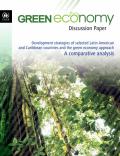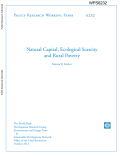
This publication explores the commonalities between the existing and proposed paradigms and approaches to development that ensures well-being and respect for nature, and the concept of green economy in the context of sustainable development and poverty eradication. More specifically, the study examines the opinions expressed by Argentina, Bolivia, Cuba, Ecuador, Nicaragua and Venezuela, with regard to the adoption of a green economy as a pathway towards sustainable development.
In the first post-transition decade after the fall of communism, Europe and Central Asia (ECA) moved its economy from plan to market. In the second decade, the 2000s, it moved from social division to inclusion. The region has an opportunity to use the third decade, the 2010s, to move from brown to green growth making production and consumption more sustainable, increasing quality of life, and reducing impacts on the climate. Lowering climate change risks in ECA will involve many different actions that fall broadly into three areas. Some, like energy efficiency improvements, are often economically beneficial regardless of climate concerns. Others, like creating a good business environment for green enterprises, are investments that create new growth opportunities. Finally, actions like expanding wind and solar energy will have net costs for some time but are essential to tackling climate change. A simple framework helps guide climate action. The priorities are to use energy more efficiently, use cleaner energy, and manage natural resources better.
This volume discusses several policy challenges facing countries to achieve and sustain inclusive growth. It is based on the proceedings of a conference co-organised by the OECD Economics Department and the World Bank on 24-25 March 2011, which brought together academics and practitioners from advanced, emerging-market and developing economies. While discussions on strong growth typically focus on the pace of economic expansion, those on inclusiveness also delve into the patterns of growth and on how its benefits are shared among the various social groups. An important message that came out of the conference is that strong growth is not necessarily inclusive and that policy action is needed to make sure that pro-growth initiatives also foster inclusiveness.
Green growth is vital to secure a brighter, more sustainable future for developing countries. Developing countries will pay a high price for failing to tackle local and global environmental threats because they are more dependent on natural resources and are more vulnerable to resources scarcity and natural disasters.
This book presents evidence that green growth is the only way to sustain growth and development over the long-term. Green growth does not replace sustainable development, but is a means to achieve it. Green growth values natural assets, which are essential to the well-being and livelihoods of people in developing countries, and if policies are designed to respond to the needs of the poorest, green growth can contribute to poverty reduction and social equity.

Much of the rural poor -- who are growing in number -- are concentrated in ecologically fragile and remote areas. The key ecological scarcity problem facing such poor households is a vicious cycle of declining livelihoods, increased ecological degradation and loss of resource commons, and declining ecosystem services on which the poor depend. In addition, developing economies with high concentrations of their populations on fragile lands and in remote areas not only display high rates of rural poverty, but also are some of the poorest countries in the world today. Policies to eradicate poverty therefore need to be targeted at the poor where they live, especially the rural poor clustered in fragile environments and remote areas.
